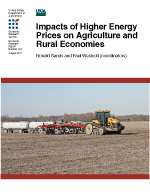Impacts of Higher Energy Prices on Agriculture and Rural Economies
- by Ron Sands, Paul Westcott, Michael Price, Jayson Beckman, Ephraim Leibtag, Gary Lucier, William D. McBride, David McGranahan, Mitch Morehart, Edward Roeger, Glenn Schaible and Tim Wojan
- 8/18/2011
Overview
Agricultural production is sensitive to changes in energy prices, either through energy consumed directly or through energy-related inputs such as fertilizer. A number of factors can affect energy prices faced by U.S. farmers and ranchers, including developments in the oil and natural gas markets, and energy taxes or subsidies. Climate change policies could also affect energy prices as a result of taxes on emissions, regulated emission limits, or the institution of a market for emission reduction credits. Here we review the importance of energy in the agricultural sector and report the results of a case study on the economic implications for the farm sector of energy price increases that would arise from plausible, constructed greenhouse-gas-emission reduction scenarios. Higher energy-related production costs would generally lower agricultural output, raise prices of agricultural products, and reduce farm income, regardless of the reason for the energy price increase. Nonetheless, farm sector impacts were modest for the scenarios and time periods examined. We demonstrate the unique distribution of effects resulting from price (or cost) increases for different types of energy due to pricing their carbon content, as well as the relative use of energy in production of different agricultural commodities.
Download
-
Entire report
Download PDF -
Report summary
Download PDF -
Download ERR123.zip
Download ZIP
We’d welcome your feedback!
Would you be willing to answer a few quick questions about your experience?

